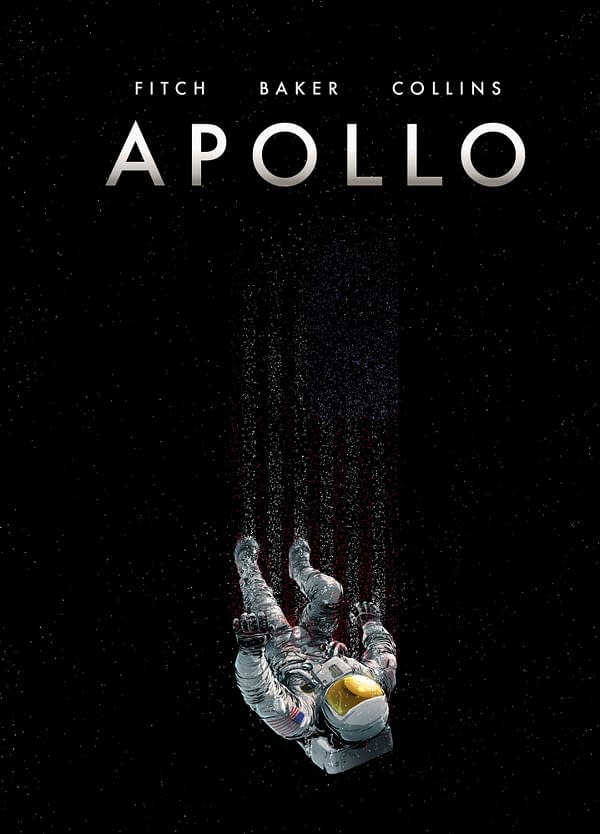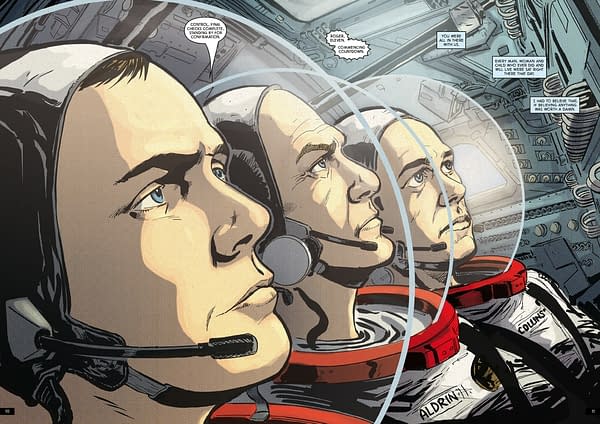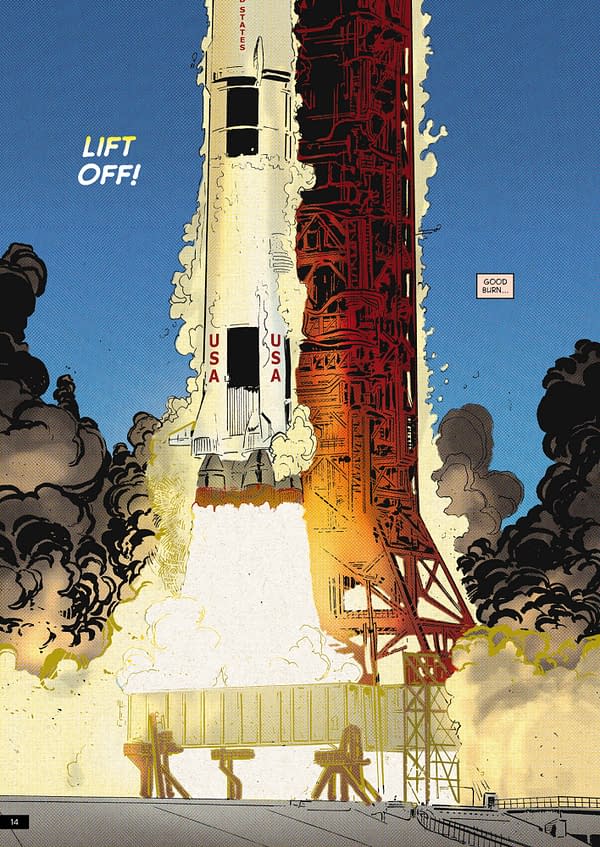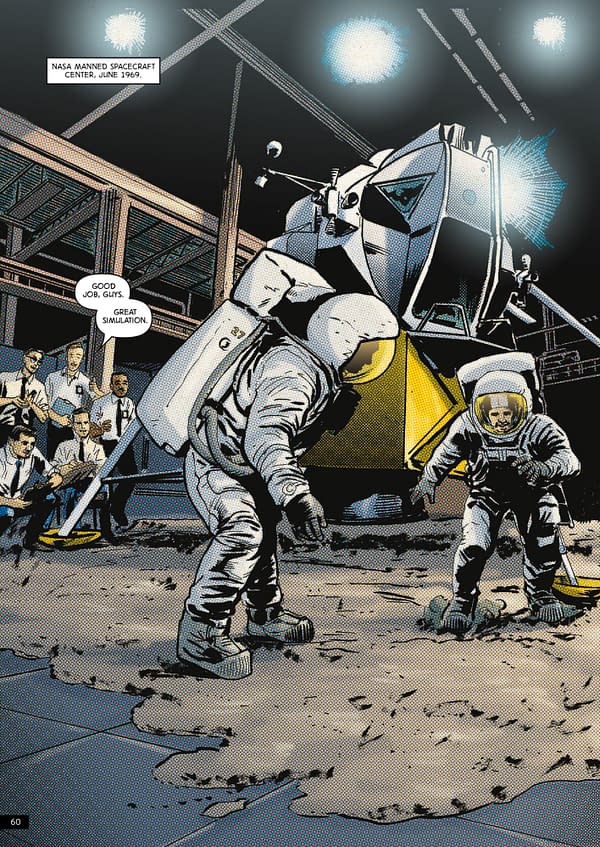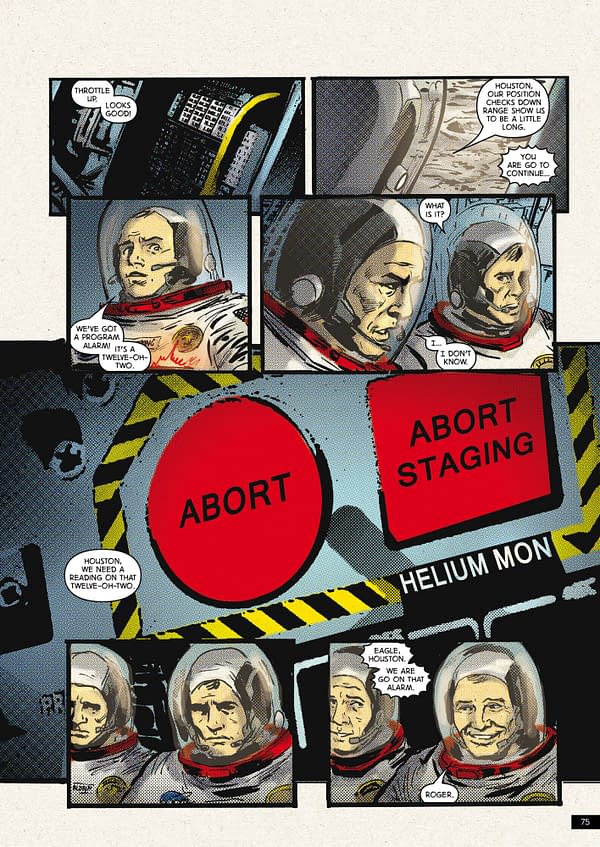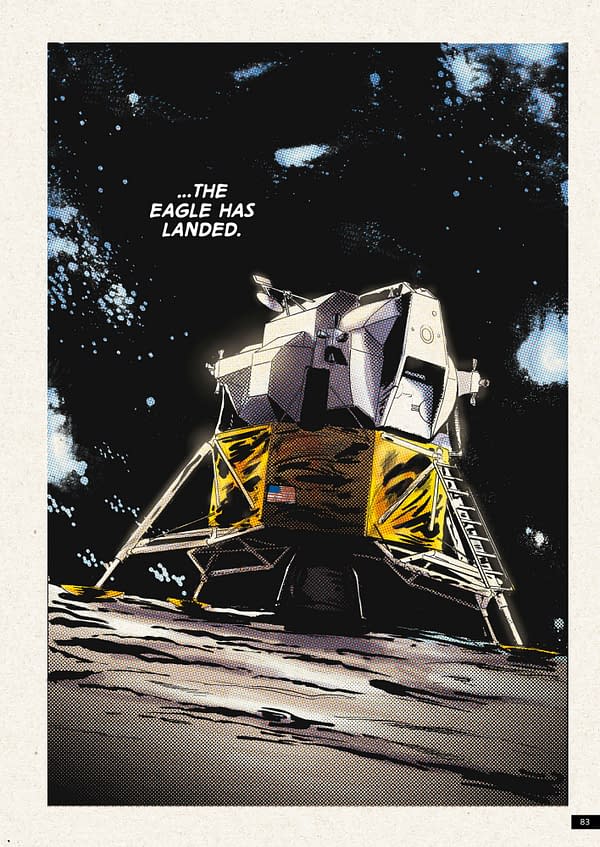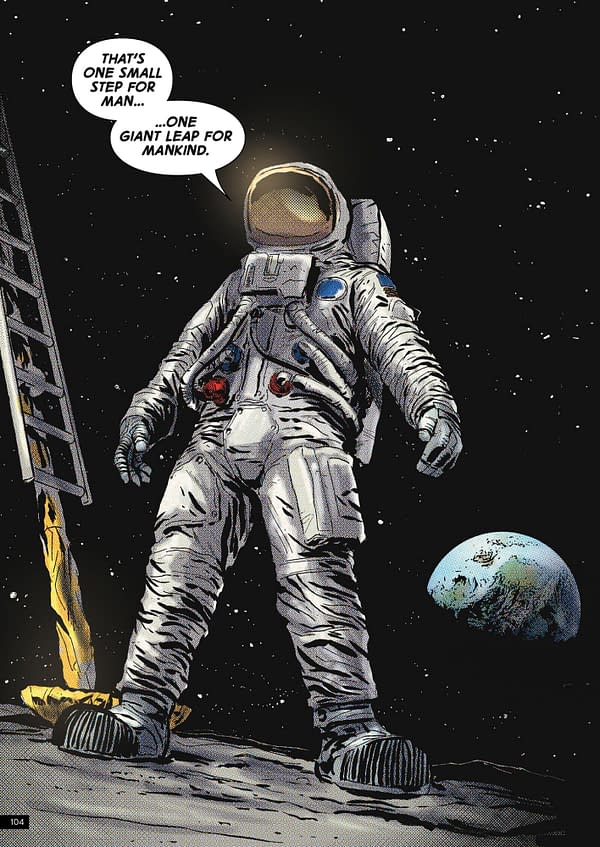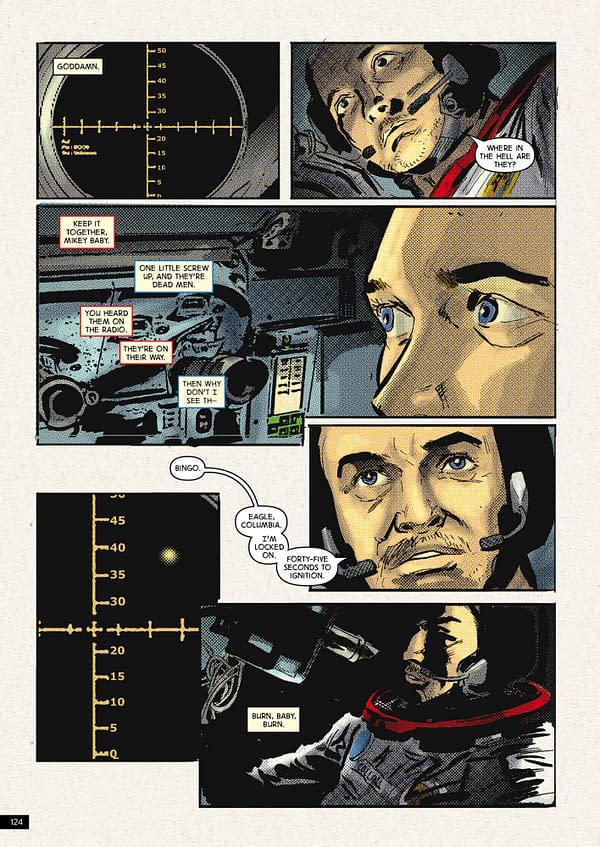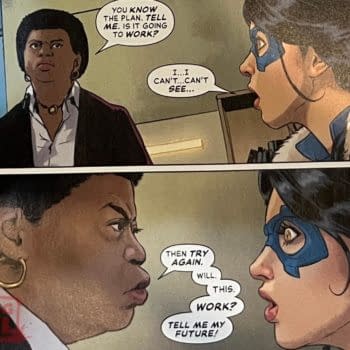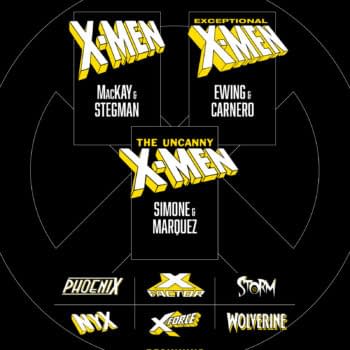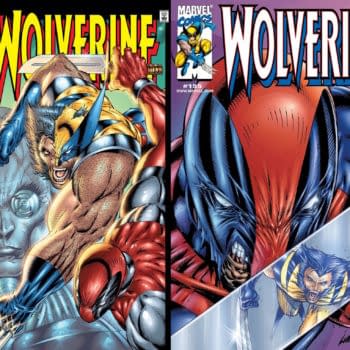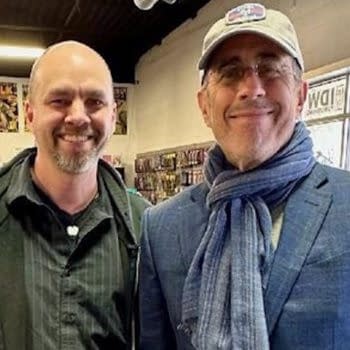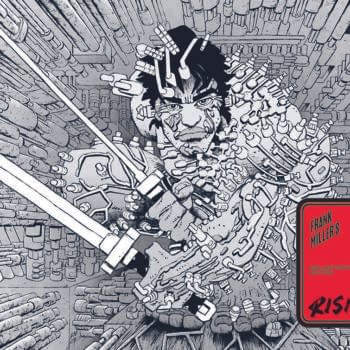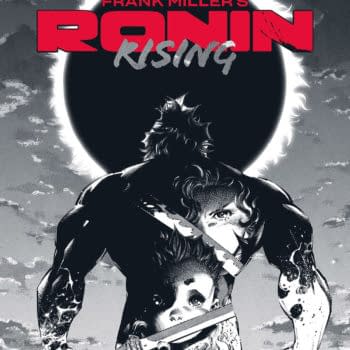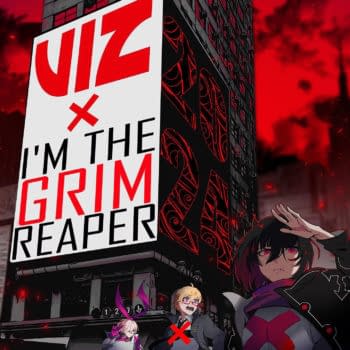Posted in: Comics | Tagged:
John Harris Dunning Talks to Matt Fitch and Chris Baker About Apollo from SelfMadeHero
John Harris Dunning asks questions of Matt Fitch and Chris Baker, about their new comic, Apollo, with Mike Collins from SelfMadeHero.
What attracted you to the subject of the Apollo mission?
It struck us that these real events and the lives of those involved already read like a movie or graphic novel. It just needed somebody to that that clay and mould it, and to our surprise nobody had taken up the challenge yet. The more we dug, the more we uncovered, and we realized we had a really emotional and exciting human drama on our hands. From the loss of Neil Armstrong's daughter, to Buzz [Aldrin]'s issues with his father, to the pressure on Mike Collins to bring his crewmates home safely – it's a writer's dream.
Janet Armstrong is a great counterfoil to the historic 'big picture' – how did you fix on her to provide this? Why did you make the creative decision to do so?
They say that behind every successful man there's a strong woman. Janet was the strong woman not just to Neil but for the whole of America. Reading interviews with her from that time she was the perfect picture of dignified bravery, and we wanted to honour her in the book. Narratively, we were able to use her to literally bring the story back down to Earth when we needed to. She represents the reader, the regular Joe (or Jane) stuck on Earth while the heroes go on their adventure. Through her we were able to articulate the fears of the nation and hammer home the danger these guys were putting themselves in by showing what was at risk if they failed.
You're crunching a huge amount of information, and following a big cast – and yet you make this look effortless in your storytelling. How did you select your moments/ events, and how did you edit those down?
We did so much research for this book and studied the Apollo program (not to mention Gemini) inside out, but ultimately writing a history-based story is the same as any other: if a scene doesn't serve the story or move it forward then it doesn't make the cut. There are loads of cool moments in the Apollo history that, while interesting, did not add anything to the story we wanted to tell. In an early draft we even had a whole prologue about how the space program had its roots in Nazi technology. It was a really cool intro but as much as we loved it we realized it was extraneous information that didn't add anything to the bigger story, so we ditched it. In Apollo, we wanted to tell the human story, so that was how we judged each scene.
There are really different – but entirely complementary – tones in the storytelling, from deep introspection to playful banter – was it a conscious decision to do this? If so, why?
Apollo 11 was the result of literally thousands of people all pulling together for a single goal. When you include the citizens of the United States in that number you're into the millions. This moment in history was comprised of countless voices so it stands to reason that our retelling should too. Plus nobody likes a one-note book. We wanted it to be informative, exciting, emotional and fun all at the same time.
The dream sequences are unexpected – and real highlights for me – from the Christmas ornament scene to the conversation with the Spirit of America – a really bold creative choice. How did you come up with this idea? Is there some inspiration from Kubrik's 2001 here?
Space invited the imagination to go walkabout. We knew this book could easily be three men in a tin can and we wanted to avoid that. On an emotional level the real-life event was a home run and we wanted to do that deeper story justice by carving out some new mythologies based on our own interpretations. Comics give a creator the ability to merge compelling images with thought provoking words. Our script was very specific and dence but Mike Collins took some of those balls we were passing each other and threw it in different directions at times. Collaboration is a really beautiful word, most of what you'll see in those moments such as the Spirit of America or the man in the moon are a joint agreement on what was going to work best. We looked to classic moon imagery. We did have a big talk about Kubrick and his vision of space, and that seminal film is referenced very subtly in one piece of dialogue.
Did you have any particular comics in mind as stylistic guides when you started working on the script for Apollo that helped shape it?
We try not to emulate other writers too overtly. Everybody wants to be Alan Moore or Grant Morrison and nobody actually is. Instead, our main reference was history books, we wanted the whole thing to have an authentic documentary feel so that people could accept the reality of it and thus enjoy the slightly unusual version of the story we were telling. But that's not to say we ignored comics entirely – Frank Miller's use of inner monologue in the likes of The Dark Knight Returns and Year One have always been an influence on us and you can definitely see that bleeding into the pages of Apollo.
In terms of the artwork, 'Classic' and 'vintage' were words being thrown around early on but then Mike joined the team and our stylistic horizons widened. He talked to us about bringing a cinematic edge to the art to complement the filmic style of the storytelling. One thing we always knew was that we were not keen to have it look too cartoon like. There needed to be a dignity, slightly left of Jack Kirby but more to the right of Ogden Whitney.
You're masters of the splash page, and you do some really great silent sequences. Tell me about your craft and what stylistic elements you believe in/ like to see in comics.
Silence in comics can be a wonderful thing, allowing the reader to dwell on images and fill in the gaps themselves, and some sequences in Apollo, such as Neil's solo dream sequences, called for a less chatty approach. One interesting example of silence in the book actually came about by accident — we'd written a whole inner monologue for Janet over three pages but when we saw the art and Mike pointed out that the pages actually worked without dialogue we agreed and decided to scrap the whole thing and keep the pages silent.
Splash pages are fun to write but over the years we've learned to use them sparingly and only when they really add something. We were rather lucky most of them are set in space so we had instant drama, and Mike can draw the moon like no one else!
Mike Collins is a real comics pro with years of experience – how did you get him onboard, and at what point in the process? This project is perhaps more indie than he's used to – why did he come onboard?
We met Mike at a con and immediately knew his art had the look we were after. Sending him the script was a bit of a shot in the dark but he loved it so much that he read it in one sitting an e-mailed us back in the middle of the night to say he was in. We didn't realise when we first approached him but Mike is actually a huge space fan and knew the details of the mission backwards. His love for the subject brought a whole new dimension to the book and greatly elevated scenes that could have crumbled in another artist's hands. Working with a pro like Mike has been a great learning experience for us as writers, he's very collaborative the discussions we've had with him during the creative process have been a pleasure. His take on it was more like high art than indie. The line between graphic novel and comic is rather like it's drawn on shifting sands. SelfMadeHero seem to be bridging this gap.
This is clearly a meticulously researched book – tell me a little about that process, and how much you did before you felt ready to start writing the script.
We consumed everything we could lay our hands on — books, documentaries, movies, interviews, official transcripts, contemporary news reports… we even spoke directly with the NASA History Office about some key technical details that we weren't able to find in the officially released information. It would be nice to say we did this all before we started writing, but as you know writing is a little messier than that so we kind of researched as we went along, filling in gaps in our knowledge as they arose. Together we have quite a fluid, spontaneous way of working that is a mix of careful plotting and random inspiration-led scene-writing, and Apollo was no different.
There's a real snap and sizzle to your scripts, a verve to the interaction of characters in particular – I can't help but feel this comes from your collaborative writing partnership, and your being able to bat things to and fro between you two. Tell me the pros of being a writing duo.
Writing with a partner is great because you have somebody to bounce and build with. The saying "two heads are better than one" exists for a reason, you know? But that doesn't mean it's always easy – we'll often disagree and debate a plot point for days, but that's all part of the process and it only makes the work better. Neither of us has an ego when it comes to writing together so it's a case of best idea wins, and by the time we're done we're both happy.
We also both polish each other's dialogue, so if something's reading a bit flat or just sounds like exposition the other will catch and fix that. We'll usually go over a draft multiple times individually and together until we're happy, and by that point we often can't even remember who wrote what because it's had both our eyes on it. And as you said, when it comes to writing characters it's useful to have somebody to talk to. We've even been known to role play scenes over whatsapp to get that back and forth feeling of a real conversation! Writing should be fun and the work is better when it is.
The Arts Council were involved in Apollo – they have helped me in the past too –in my case they were crucial to getting my book 'Tumult' up and running – I believe we need more arts funding in this arena in particular – what are your thoughts about this?
Absolutely. Without the Arts Council, Apollo simply would not exist. It's a tough application process and not everybody is successful but for those who are it's a real lifeline, allowing them to tell stories that they might not have been able to otherwise. Thankfully, the days of comics being considered somehow lower down the literary scale seem to be behind us. Sabrina being nominated for the booker prize is testament to that, and hopefully we'll see more funding and support evolving along with the medium that we all love.
Do you think comics are a particularly good medium for telling this kind of historical story?
Comics are a great medium for telling any story! But the great thing about using them to tell historical stories is it gives you an opportunity to engage with readers who you might not have otherwise. For fans of space history, this might be the first time they've ever read a graphic novel, and the idea that we might be able to introduce new audiences to the medium we love is exciting and humbling. Likewise, comics readers who might not otherwise take an interest in history will hopefully be inspired to find out more.
What are your all-time favourite comics/ which titles do you consider classics?
We're both huge fans of Watchmen. It's a cliché, but it's a cliché for a reason. Every time you read that book you discover something new, and as a comics writer it's an amazing textbook. To this day there are tricks and techniques to be learned within its pages. Other key texts on the Fitch/Baker bookshelf include Preacher, The Boys, any and all solid Batman titles such as Year One, The Long Halloween and of course The Killing Joke.
What contemporary comics do you admire and why?
We're huge fans of Rick Remender at the moment. Everything he writes is gold and his pacing is great. You're never bored reading a Remender book. We're both big Dan Slott fans (and he's a really nice guy in person, which makes us like him even more). Sex Criminals is fun and fresh. Chris can't stop reading Benjamin Marra.
You have a go-getter attitude what with your not waiting around for commissions and starting your own publishing venture – Dead Canary – with some fantastic talent attached. And now you have this graphic novel Apollo from prestigious publisher SelfMadeHero under your belt – something some comics creators who've been working in the industry for decades don't get to do… what are your ambitions from here? What kind of comics do you want to make?
We have a saying that we live by: "The best way to get shit done is to do shit". It sounds simple but so many people sit around thinking the world owes them something but they're not doing anything to make it happen. Self-publishing seemed like the shortest route to getting our early stories out there, and it gave us a great stepping stone into the wider comics world, helping us to build a fanbase and get noticed by SelfMadeHero. If you want something, you have to go and get it, and we're not planning on slowing down.
Right now we're pitching to the majors, and we've been talking to a TV producer about adapting one of our unpublished stories, so that's very exciting. But we'll keep self-publishing too simply because it's fun and because we can! As for what kind of comics we want to make next, well we've got all sorts in the pipeline. We have another 'real history' story along the lines of Apollo that we'd like to get our teeth into but we're also going back to our sci-fi roots for a project we're currently working on with Joe Totti and we've just kicked off something new with Amrit Birdi. We're also just finishing up the script for a story set in the world of British rock n roll, so we'll be on the hunt for an artist to collaborate with that on… so we've got lots going on!
What is your advice for comics writers starting out, trying to get their work out to the public?
The only way to get shit done is to do shit! In all seriousness, just do it. Get writing. Go to cons, make friends with other writers and artists, help each other. You can do it!
Apollo is out now from SelfMadeHero.
The 'Art of Apollo and Tumult' Exhibition is on display in the Orbital Comics Gallery from 15th-30th August. Free Entry.
Matt, Chris and John will be joined by Mike Collins, Michael Kennedy and SelfMadeHero's Head of Sales and Marketing, Sam Humphrey, for a live Q&A in Orbital Comics on 16th August, 7:30PM. Free Entry.
For more info on Matt and Chris's work, visit fitchbakercomics.com or follow them on Twitter: @mattfitch81, @csbakercomics


